

History of Philosophy without any gaps. Socratic Method 2017. 10 Psychological States You've Never Heard Of... and When You Experienced Them. Rene Guenon and Penultimate Times (pt. 1) Overview of Julian Jaynes Theory of Consciousness and the Bicameral Mind. In January of 1977 Princeton University psychologist Julian Jaynes (1920–1997) put forth a bold new theory of the origin of consciousness and a previous mentality known as the bicameral mind in the controversial but critically acclaimed book The Origin of Consciousness in the Breakdown of the Bicameral Mind.
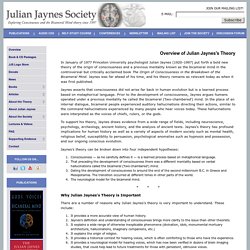
Jaynes was far ahead of his time, and his theory remains as relevant today as when it was first published. Jaynes asserts that consciousness did not arise far back in human evolution but is a learned process based on metaphorical language. Prior to the development of consciousness, Jaynes argues humans operated under a previous mentality he called the bicameral ('two-chambered') mind. In the place of an internal dialogue, bicameral people experienced auditory hallucinations directing their actions, similar to the command hallucinations experienced by many people who hear voices today.
Psychology. Lacan Dot Com Videos. Enter, the Speculative Realists. AskPhilosophers.org. A.
Philosophy & Psychology Resources: Websites. 29 Oxford University Philosophy Lectures. Aviso de derrumbe. No es extraño que Alemania, el país que ha producido mentes como las de Kant, Hegel, Nietzsche o Marx, tenga devoción por la filosofía, lo inusual es que la nueva revelación del pensamiento alemán —tronco inevitable del pensamiento occidental moderno— sea un autor oriental que cuando era un treintañero cambió Corea del Sur por Europa.

Hoy los libros de ese autor, Byung-Chul Han, son prestigiosos superventas en un país que todavía discute apasionadamente a sus filósofos vivos, sean Jürgen Habermas, Peter Sloterdijk o Richard David Precht. Han ya es uno de ellos. Byung-Chul Han nació en 1959 en Seúl y allí estudió metalurgia, pero pronto llegó a la conclusión de que con aquello no iba a ninguna parte. La carrera ni siquiera le interesaba. Decidió instalarse en Alemania y estudiar literatura, aunque acabó interesado en la filosofía.
An Enquiry Concerning Human Understanding/David Hume. Rhetoric - Wikipedia, the free encyclopedia. Painting depicting a lecture in a knight academy, painted by Pieter Isaacsz or Reinhold Timm for Rosenborg Castle as part of a series of seven paintings depicting the seven independent arts. This painting illustrates rhetorics.
Critical Thinking. Plato. Stoicism. Descartes. Locke, Berkeley, Hobbes. Hume and Kant. The 1700s saw many great thinkers who have left a lasting impact on modern philosophy and science -- and psychology.
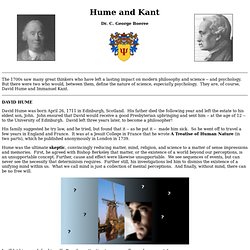
But there were two who would, between them, define the nature of science, especially psychology. They are, of course, David Hume and Immanuel Kant. David Hume was born April 26, 1711 in Edinburgh, Scotland. His father died the following year and left the estate to his eldest son, John. Kierkegaard. Nietzsche. Phenomenology / Existensialism. Contemp.Philosophers: presentations by & about.
Analytic Philosophy. Nontology. The Mortality Paradox. By Maria Popova “Our overblown intellectual faculties seem to be telling us both that we are eternal and that we are not.”
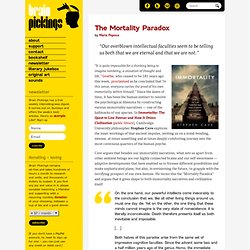
Conversations on the Intersection Between Faith and Science. The award-winning public radio program On Being, with Krista Tippett, has provided us with in-depth audio interviews on the intersection between faith and science with a range of guests including theoretical physicists and Vatican Observatory astronomers.
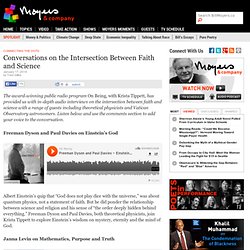
Listen below and use the comments section to add your voice to the conversation. Freeman Dyson and Paul Davies on Einstein’s God Albert Einstein’s quip that “God does not play dice with the universe,” was about quantum physics, not a statement of faith.
William James. Be not afraid of life.
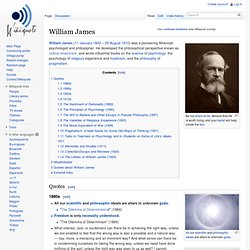
Believe that life is worth living, and your belief will help create the fact. William James (11 January 1842 – 26 August 1910) was a pioneering American psychologist and philosopher. He developed the philosophical perspective known as radical empiricism, and wrote influential books on the science of psychology, the psychology of religious experience and mysticism, and the philosophy of pragmatism. Quotes[edit] We are all ready to be savage in somecause. Personality: Tests, Types, Theories.
Martha Nussbaum. Other Thinkers. Joshua Knobe & x-phi. A new breed of thinkers takes the search for wisdom to the street.
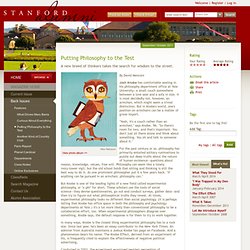
Josh Knobe has comfortable seating in his philosophy department office at Yale University—a small couch somewhere between a love seat and a sofa in size. It is most decidedly not, however, an armchair, which might seem a trivial distinction. Albert Bandura. Albert Bandura (born December 4, 1925) is a psychologist who is the David Starr Jordan Professor Emeritus of Social Science in Psychology at Stanford University.

For almost six decades, he has been responsible for contributions to many fields of psychology, including social cognitive theory, therapy and personality psychology, and was also influential in the transition between behaviorism and cognitive psychology. He is known as the originator of social learning theory and the theoretical construct of self-efficacy, and is also responsible for the influential 1961 Bobo doll experiment.
A 2002 survey ranked Bandura as the fourth most-frequently cited psychologist of all time, behind B. F. Skinner, Sigmund Freud, and Jean Piaget, and as the most cited living one.[1] Bandura is widely described as the greatest living psychologist,[2][3][4][5] and as one of the most influential psychologists of all time.[6][7] Saul Kripke. Saul Aaron Kripke (/sɔːl ˈkrɪpki/; born November 13, 1940) is an American philosopher and logician.
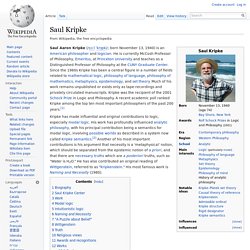
He is currently McCosh Professor of Philosophy, Emeritus, at Princeton University and teaches as a Distinguished Professor of Philosophy at the CUNY Graduate Center. Since the 1960s Kripke has been a central figure in a number of fields related to mathematical logic, philosophy of language, philosophy of mathematics, metaphysics, epistemology, and set theory.
Much of his work remains unpublished or exists only as tape-recordings and privately circulated manuscripts. Kripke was the recipient of the 2001 Schock Prize in Logic and Philosophy. John Searle. John Rogers Searle (/sɜrl/; born July 31, 1932) is an American philosopher and currently the Slusser Professor of Philosophy at the University of California, Berkeley.
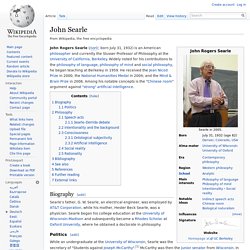
Widely noted for his contributions to the philosophy of language, philosophy of mind and social philosophy, he began teaching at Berkeley in 1959. He received the Jean Nicod Prize in 2000; the National Humanities Medal in 2004; and the Mind & Brain Prize in 2006. Among his notable concepts is the "Chinese room" argument against "strong" artificial intelligence. Graham Priest. Graham Priest[1] (born 1948) is Distinguished Professor of Philosophy at the CUNY Graduate Center, as well as a regular visitor at the University of Melbourne where he was Boyce Gibson Professor of Philosophy and also at St. Andrews University. He was educated at the University of Cambridge and the London School of Economics.
His thesis advisor was John Lane Bell. Work[edit] Leon Wieseltier. Leon Wieseltier (/ˈwiːzəltɪər/; born June 14, 1952) is an American writer, critic, amateur philosopher and magazine editor. From 1983 to 2014, he was the literary editor of The New Republic. He is currently the Isaiah Berlin Senior Fellow in Culture and Policy at the Brookings Institution and a contributing editor and critic at The Atlantic. Life and career[edit] Daniel Smith. I believe that people are mostly at different levels of awareness or consciousness in their lives and that we look at life through our own set of glasses. Most of us are functioning based on ideas and theories that have been passed on from generation to generation and so we are seeing the world through our ideas and not necessarily looking at reality. As a species we have advanced tremendously in technology and commerce, but one thing we have neglected to advance in is consciousness, the ability to be awake in the world.
Today’s society has become extremely efficient at doing things with little or no awareness, we just run on auto pilot. David Chalmers. David John Chalmers (/ˈtʃælmərz/;[1] born 20 April 1966) is an Australian philosopher and cognitive scientist specializing in the area of philosophy of mind and philosophy of language. He is Professor of Philosophy and Director of the Centre for Consciousness at the Australian National University. He is also Professor of Philosophy at New York University.[2] In 2013, he was elected a Fellow of the American Academy of Arts & Sciences. Life[edit] Since 2004, Chalmers has been Professor of Philosophy, Director of the Centre for Consciousness, and an ARC Federation Fellow at the Australian National University. A Rhodes Scholar raised in Australia, Chalmers received his PhD at Indiana University Bloomington under Douglas Hofstadter.
He is the lead singer of the Zombie Blues band which performed at the Qualia Fest in 2012.[5] in New York. Thought[edit] Intelligence: The Evolution of Night Owls. IQs and Zs Night owls are smarter than other people, and now we may know why. The modern world contains many features our slow-to-evolve brains still find unfamiliar—cars, TVs, hot dogs on a stick. But the world has always thrown new stuff at us, and brighter humans may adapt more ably. KOHLBERG'S STAGES OF MORAL DEVELOPMENT. Lawrence Kohlberg was a moral philosopher and student of child development. What Does Lacan Say About… Desire? Tutorial: Concrete vs. Abstract Thinking. WHAT ARE CONCRETE AND ABSTRACT THINKING? Rage—Coming Soon From a Narcissist Near You.
Alan Macfarlane King's College Cambridge history anthropology. How To Read People. Rosenhan experiment. A Experiência MONDRAGON / The Mondragon Experiment (1980) LEGENDA PT. Les Classiques des sciences sociales. Abel-Rémusat, Jean-Pierre [1788-1832] sinologue, titulaire de la 1re chaire de langue et littérature chinoise au Collège de France [ sous-collection "Chine ancienne" ]
Social Psycology And Conflict. 5 Brainwashing Tricks That Work No Matter How Smart You Are. #2. Everyone Has the Same Moral Code, They Just Use It Differently Win McNamee/Getty Images News/Getty Images Question: Triple Nine Society. Carl Rogers Empathy Lecture parts 1 and 2. American Psychological Association Bolstered C.I.A. Torture Program, Report Says.
WASHINGTON — The American Psychological Association secretly collaborated with the administration of President to bolster a legal and ethical justification for the torture of prisoners swept up in the post-Sept. 11 war on terror, according to a new report by a group of dissident health professionals and human rights activists. The report is the first to examine the association’s role in the interrogation program. It contends, using newly disclosed emails, that the group’s actions to keep psychologists involved in the interrogation program coincided closely with efforts by senior Bush administration officials to salvage the program after the public disclosure in 2004 of graphic photos of prisoner abuse by American military personnel at Abu Ghraib prison in Iraq. 10 Most Brilliant Social Psychology Experiments.
Ten of the most influential social psychology experiments. Online Psychoanalytic library. Mark Pagel, evolution. biol. : "Infinite Stupidity" (text +vid) Idéologie du Noûs. Propaganda and Manipulation: How mass media engineers and distorts our perceptions. Nicholas Humphrey. D. Kahneman: presentation to tech titans: Thinking about thinking. WORLD PREMIERE: JESSE DYLAN'S DOCUMENTARY ON THE EDGE QUESTION — 2014. Steven Pinker: The stuff of thought. Jaron Lanier. 9 Mind-Bending Epiphanies That Turned My World Upside-Down. Shocking Experiment Shows How People Can Ignore Dying Strangers Based On What Clothes They Wear. SPECULATIONS ON THE FUTURE OF SCIENCE. Wired 8.04: Why the future doesn't need us. Compassion. Altruism. Kindness. Patience. Portrait of an INFP.